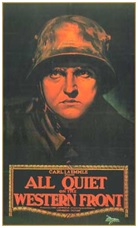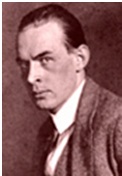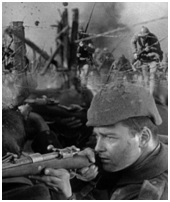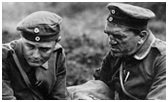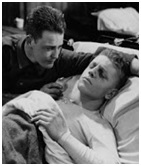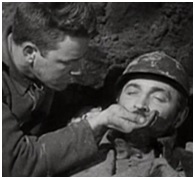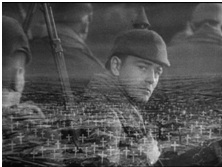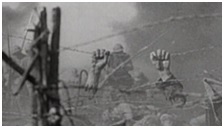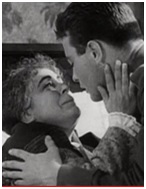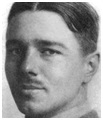|
 |
|
 |
|
|
||
All Quiet on the Western Front - War and Ethics
All Quiet on the Western Front (1930)
Famous for... Being a classic anti-war film from a German viewpoint in World War One and so banned by the Nazis.
Based on... Erich Remarque’s (pictured right below) book, All Quiet on the Western Front
Director Lewis Milestone
Oscars Two (best picture and best director) Key characters Paul B äumer (Lew Ayres), a young German soldier (pictured right). Katczinsky or ‘Kat’ (Louis Wolheim), his army sergeant and friend.
The story Some sixteen-year-old German school students (including Paul B äumer) are encouraged by their patriotic teacher, Professor Kantorek, to fight on the Western front against the French army in the First World War. They are trained as soldiers by their old postman, cruel Sergeant Hilmmelstoss. After meeting the likeable Sergeant Katczinsky (Kat), they soon learn that war isn’t noble but horrific in their rat-infested trenches. (Paul and Kat are pictured right) After thousands are killed in a battle, neither side advances. The soldiers blame the war on the:
When visited in the hospital by Paul, his friend, Franz Kemmerich (pictured right) dies after being devastated by his leg's amputation. Another soldier puts on his boots, whose subsequent owners are shown, dying as they wear them. Himmelstoss is killed, and Paul stabs a French soldier in the throat. Because of heavy shell
fire, he is forced to stay the night with the dying Frenchman, attempting to wash his blood off his
hands. Explosions light up his grotesque face, filling Paul with remorse and desperation for forgiveness. He finds a picture of the dead man’s wife and child in his pocket. He is called Gérard Duval (pictured right). Paul promises that he will take care of his family and then breaks down sobbing. After being consoled by Kat, he tries to reassure himself by saying “war is war”. After his school friend, Albert, loses a leg, Paul returns home. He looks nostalgically at his childhood bedroom and his butterfly collection. But the war has alienated him from his home town family, including his sick mother and sister, Anna. People are totally unaware of how horrific the war is. He hears Kantorek still encouraging his students to go to war and Paul is booed for cowardice, when he gives a pacifist talk. The boys are just as keen to fight as Paul was. His mother tearfully kisses him goodbye, giving him some new woollen underwear. When he returns to the trenches, he tells Kat about his difficult time at home and how much he wanted to get
back and see him. “You’re all I’ve got left”, he says. So he is totally devastated by Kat’s death. Just before the armistice (bringing “all quiet on the western front”) and with all his friends dead, Paul is daydreaming and sitting alone in his trench. He sees a butterfly and yearns for its beauty and innocence. But, he is killed, reaching out for it. The ghostly images of Paul and his friends are shown amidst a sea of white crosses (pictured right), looking back to the battlefield with anger and sadness.
What does it say about war? 1. It’s horrible War isn’t glorious but kills and maims people (pictured right). Paul is horrified when the Frenchman he kills is a human being like himself with a wife and child. He says about him: “But you're just a man like me, and I killed you. Forgive me, comrade”
2. It dehumanizes people Paul’s horrific war experiences emotionally detach him from:
So his death, pursuing a butterfly, signifies his lost:
War kills feelings, as shown by Muller’s request for the disabled Kemmerich’s boots. 3. Remember the people who are left behind Paul’s mother is heartbreakingly worried about him (pictured right). His village’s ignorance about the war shows that you can’t know something until you’ve experienced it.
Paul attacks Kantorek’s patriotism. The soldiers believe that ordinary people are dying only to please the:
In his patriotic speech, Kantorek quotes the famous line: Dulce et decorum est pro patria mori (It is sweet and right to die for your country) This phrase was derided by Wilfred Owen (pictured right above) in one of his World War One poems.
Key quotes on war and ethics We sleep and eat death, Paul If they threw away these rifles and these uniforms, you could be my brother, Paul (about the Frenchman he has killed) Sweet and fitting it is to die for the Fatherland, Kantorek.
Two film websites to recommend 1. filmsite.org (run by Tim Dirks). 2. aveleyman.com (run by Tony Sullivan) |
|
|
||
|
|
||
| Copyright © wisdomtowin.com 2025 All Rights Reserved | ||
|


